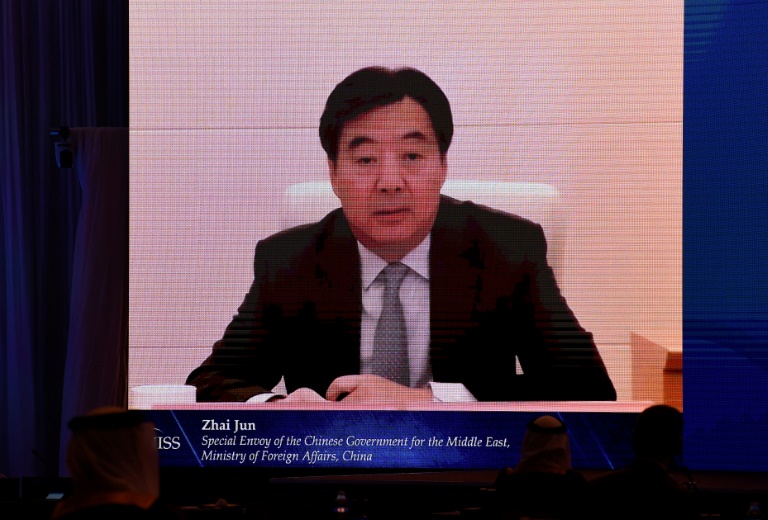Chinese envoy heads to Middle East in bid to contain war

Jun Zhai, China’s foreign ministry special envoy for the Middle East, heads to the region this week, although there are no details on his itinerary
Shanghai – China will this week weigh into the Israel-Hamas war by sending its special envoy to the Middle East, after the United States asked it to use its influence to stop the conflict from spreading.
Washington says it hopes China’s friendship with Hamas backer Iran could help calm the conflict, particularly after Beijing brokered a detente between long-time foes Tehran and Riyadh earlier this year.
Iran has warned of a possible “pre-emptive action” against Israel as it prepares a ground offensive on the Gaza Strip. There are also fears that Lebanon-based Hezbollah, which is also backed by Iran, could open up a second front with Israel.
“Our message was that he thinks it’s in our shared interest to stop the conflict from spreading,” US State Department spokesman Matthew Miller told reporters on Saturday, after Antony Blinken spoke with Chinese Foreign Minister Wang Yi by phone.
“He thought it could be useful if China could use its influence.”
China then announced envoy Zhai Jun will visit the Middle East this week, with foreign ministry spokeswoman Mao Ning saying his objective was “to pool international consensus, urge relevant parties to stop hostilities, cool down the situation and create necessary conditions for political settlement”.
No details have yet been announced on Zhai’s itinerary or the exact timing of his trip.
– Plea to China –
Israel declared war on Hamas after the Islamist group’s fighters broke through the heavily fortified Israeli border and shot, stabbed and burnt to death more than 1,400 people.
Israeli air strikes on the Hamas-controlled Gaza Strip have since flattened neighbourhoods and killed at least 2,750 residents of the impoverished territory, according to Palestinian authorities.
Blinken’s plea to Beijing could be based on the hope that “China’s supposed proximity to a wide range of players — from the Palestinians, to Iran, to Saudi Arabia and more — would be something they would leverage”, said Raffaello Pantucci, a senior fellow at Singapore’s S. Rajaratnam School of International Studies.
However, Beijing’s impact on the Israel-Hamas conflict is likely to be far weaker than its role in the Saudi Arabia-Iran deal, Pantucci said.
With Saudi Arabia and Iran, “the Chinese were essentially jumping on to a train that was already in motion”, he added.
With Israel and Hamas, Beijing is “trying to initiate something which others have struggled to initiate and keep going for a long time… between two adversaries who are locked into a deathly struggle with each other”.
– ‘Tremendous opportunity’ –
China has for years failed to make progress on the decades-long deadlock between Israel and the Palestinians, despite repeatedly pushing a vague proposal at the United Nations calling for a two-state solution.
Beijing has historically been sympathetic to the Palestinians, though it has supported the nationalist Palestine Liberation Organisation rather than Islamist Hamas.
It refrained from explicitly condemning Hamas for the October 7 attacks that triggered the current conflict.
But on Sunday Foreign Minister Wang said Israel was now acting “beyond the scope of self-defence” and slammed what he described as its “collective punishment of the people of Gaza”.
“Wang Yi has actually intensified his criticism of Israel’s actions… so while Israel will want Beijing to apply pressure on Arab states and Iran to bring them to the table, it is unlikely to view China as an impartial broker,” Manoj Kewalramani from India’s Takshashila Institution told AFP.
A bigger obstacle to meaningful engagement is China’s lack of direct contact with Hamas, which would force it to go through Tehran in order to place pressure on the militant group, according to Jean-Pierre Cabestan, a senior research fellow at the Asia Centre in Paris.
This could be an issue because while Iran has applauded Hamas’s attack, it has denied playing any role in it.
Still, Beijing stands to gain from even an attempt to mediate, as it seeks to play a more assertive role on the international stage.
The conflict is “a tremendous opportunity to point to what Beijing has long argued is Western hypocrisy on the issue of international law and human rights”, Kewalramani said.
“The fact that Western leaders don’t seem to be talking about proportionality in the Israeli response… is an opportunity for Beijing to hit back at the West’s claims of protecting a ‘rules-based order’,” he told AFP.
